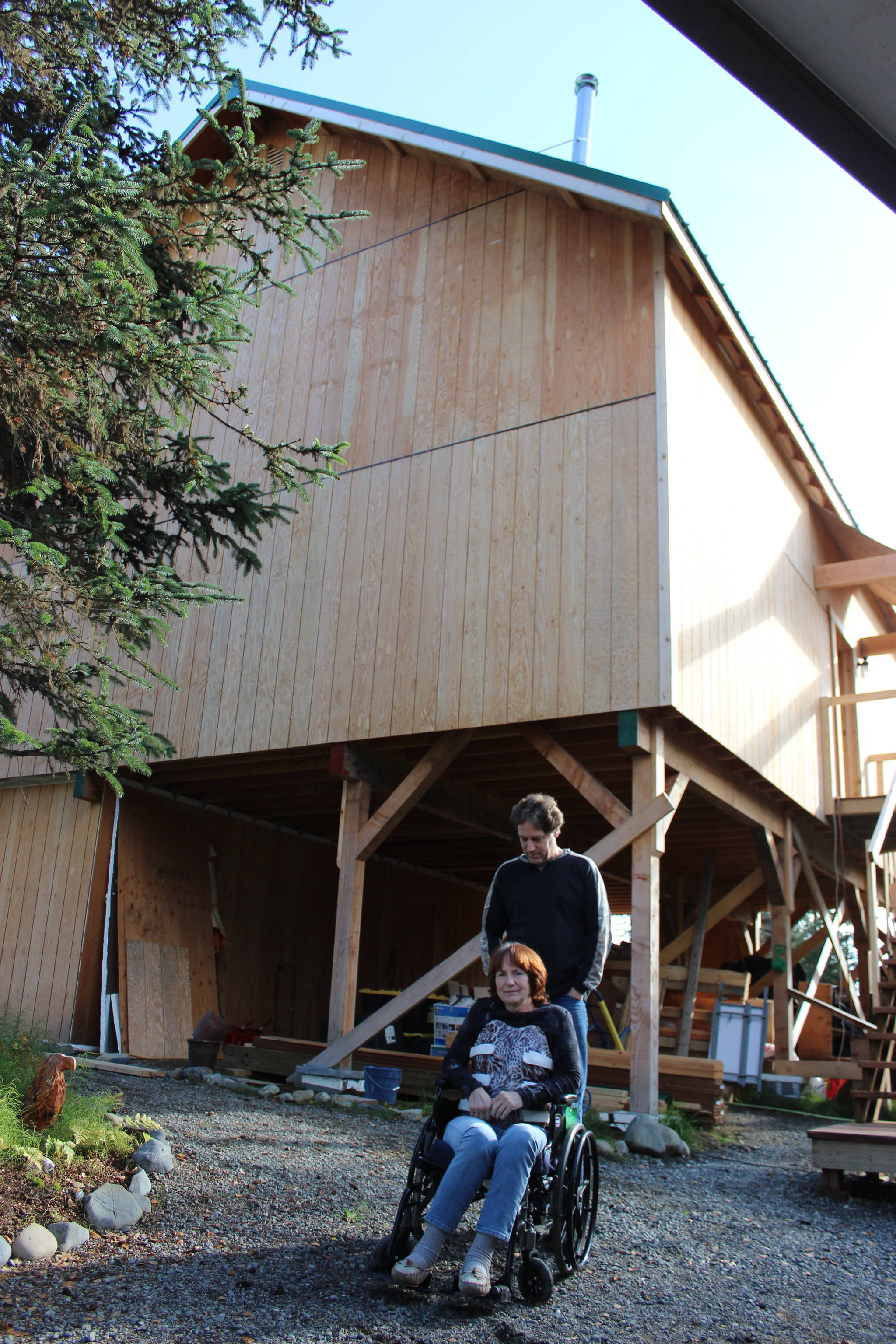When Yvonne Bouchard and Russ Morse vacationed in Homer two years ago they knew they’d found the place they wanted to live. In July, Bouchard fell from the deck of the Eagle Aerie home she and Morse are building, breaking her back. Now the couple is redefining what’s needed to live in this piece of paradise.
“We started in Anchorage and drove down the Kenai Peninsula and when we got to the bottom of the peninsula, we just fell in love with Homer,” said Bouchard of the vacation she and Morse took in 2015. The couple was living in the Seattle area at the time.
On the final day of their visit, Bouchard saw a real estate listing for five acres on Eagle Aerie. A driveway was in place. A woodpile awaited new owners. And from the property’s highest point there were sweeping views of the bay and the Kenai Mountains.
“We looked at it and said, ‘This is it.’ Russ was so happy he was crying. It’s what he’d been looking for,” said Bouchard.
Moving into a 32-foot mobile home, Bouchard and Morse began building their multi-level new home. They put in a well. When bringing electricity to their site proved cost-prohibitive, they opted for a generator and solar panels. During the winter, with snow reaching three feet deep at their hilltop address, building slowed down, but this spring Morse, a carpenter by trade, completed the roof. In May, he took a three-month break, found employment and worked on their house in his off hours.
On the morning of July 13, Morse was working inside the house. Bouchard was on the deck, assembling a shelf unit. The instant she sat on the folding chair behind her, she realized it wasn’t positioned securely.
“I thought, ‘Oh my god, I’m falling. I’m going to land on my back and it’s going to be bad,’” she said.
Hearing her yell, Morse ran outside and found Bouchard on the ground, the chair smashed beneath her legs.
A 9-1-1 call brought a response from Kachemak Emergency Service volunteers.
“We’ve implemented what we call our ‘sprinter program,’” said Chief Bob Cicciarella, of an effort to better cover the 214-square-mile service area. “Our high level EMTs and paramedics carry advanced life support with them in their vehicles and they go directly to the scene so we can start giving high-level care and then it’s not quite as critical for the ambulance to get there right away.”
Details of what came next remain a bit fuzzy for Bouchard. There was a ride over the potholes of Eagle Aerie.
“We tried to move her with the least amount of pain and discomfort and I think it worked out well,” said Cicciarella. “I hope she was satisfied.”
Arrival at South Peninsula Hospital’s emergency room was followed by a helicopter flight to an Anchorage hospital and surgery.
“It’s what the doctor calls a complete spinal cord lesion,” said Bouchard of the diagnosis. “In other words, it’s thoroughly broken through the vertebrae.”
“It’s like cutting an electrical cord in half,” said Morse.
The paralysis of her legs is permanent, a situation Bouchard described matter of factly, but admitted to more emotional moments. She’s realistic, but also open to participating in “new research or trials that I’d like to get involved with. I know they’re going on, but that’s down the road awhile. I’ve got to figure out how I’m going to live for now.”
Now that means spending her days in a wheelchair. No standing. No walking. With screws in her vertebrae, Bouchard wears a turtle-like brace during the day while the bones in her back heal. The nerve pain in her legs is a constant companion.
Her new limitations mean changes to their house.
“She didn’t want me to drop the cabinets, but we had to move one bathroom wall over. And having a lift added will be huge,” said Morse of installing a lift that would make it possible for Bouchard to enter and exit the home on her own.
To help with the cost of a lift, Bouchard applied for an Alaska Community Development Corporation grant with the help of the Independent Living Center.
“If people have questions about resources for housing modifications, please call ILC,” said Joyanna Geisler, ILC executive director. “Some grants and loans have waiting lists, so the sooner the better.”
With Bouchard unable to help, Morse is trying to get the house livable so they won’t have to spend another winter in the mobile home. Insulation needs to be added beneath the floor. Wood needs to be chopped. The water tank needs installation.
“It’s a horrible feeling when you’re an active person,” Bouchard said of being unable to lend a hand.
Bouchard and Morse have learned they’re not alone in their new hometown, however. Last winter, as snow piled up, a neighbor plowed their driveway. With Independent Living Center’s assistance, they maneuvered the grant-application jungle with surprising speed. Fran Van Sandt also has offered support since Bouchard’s fall, asking a friend in Anchorage to visit Bouchard in the hospital and contracting someone in Homer to do construction cleanup around the couple’s house.
“She’s got such a great attitude,” Van Sandt said of Bouchard. “She’s said, ‘I know I’m doing the best I can and I know there are things I’ll never do again,’ but she’s so upbeat.”
Van Sandt also has offered to coordinate others wanting to lend a hand to Bouchard and Morse. Messages can be left at 235-8761.
McKibben Jackinsky is a freelance writer who lives in Homer. She can be reached at mckibben.jackinsky@homernews.com.



